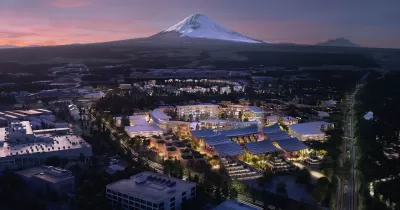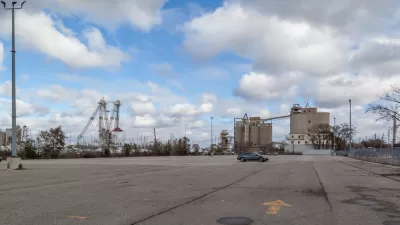Checking in with Toyota's plans for an interconnected smart "city of the future" means considering how their approach might differ from other attempts at similar projects.

Corporate interest in smart city technology has brought numerous concepts and potential projects into the public spotlight in recent years with a notable lack of success in implementing new technologies in a robust way. Where others (most notably, Sidewalk Labs) have failed, Toyota has big plans to create a new, interconnected smart city, a "city of the future" to stand as a proof of concept for such innovations as autonomous vehicles and smart houses.
"The 175-acre Woven City project, to sit at the base of Mt. Fuji, would house some 2,000 residents and will be outfitted with connected infrastructure, clean buildings and artificial intelligence (AI)," writes Jason Plautz on the ambitious scope of the project. Some onlookers think that Toyota could have more success than other corporations who have spearheaded smart city development, in part due to the lessened regulatory requirement involved in building a city from scratch.
Public concern has put a damper on smart city development projects in the past. Alphabet's Sidewalk Labs planned a development on the waterfront of Toronto that sought to "showcase everything from mass timber buildings to adaptive pavement that would accommodate all forms of mobility," but the "project was dogged with concerns about how the company would store and protect data collected from residents," Plautz reflects.
After Toyota's January announcement of plans for the spawning of the Woven City, very few details about the project have been revealed, says Plautz. Nearly a year later, ears are perked for more information about the viability of the project and its implications for smart city technology in other cities worldwide.
FULL STORY: Can Toyota succeed where Sidewalk Labs failed?

Planetizen Federal Action Tracker
A weekly monitor of how Trump’s orders and actions are impacting planners and planning in America.

Maui's Vacation Rental Debate Turns Ugly
Verbal attacks, misinformation campaigns and fistfights plague a high-stakes debate to convert thousands of vacation rentals into long-term housing.

San Francisco Suspends Traffic Calming Amidst Record Deaths
Citing “a challenging fiscal landscape,” the city will cease the program on the heels of 42 traffic deaths, including 24 pedestrians.

Amtrak Rolls Out New Orleans to Alabama “Mardi Gras” Train
The new service will operate morning and evening departures between Mobile and New Orleans.

The Subversive Car-Free Guide to Trump's Great American Road Trip
Car-free ways to access Chicagoland’s best tourist attractions.

San Antonio and Austin are Fusing Into one Massive Megaregion
The region spanning the two central Texas cities is growing fast, posing challenges for local infrastructure and water supplies.
Urban Design for Planners 1: Software Tools
This six-course series explores essential urban design concepts using open source software and equips planners with the tools they need to participate fully in the urban design process.
Planning for Universal Design
Learn the tools for implementing Universal Design in planning regulations.
Heyer Gruel & Associates PA
JM Goldson LLC
Custer County Colorado
City of Camden Redevelopment Agency
City of Astoria
Transportation Research & Education Center (TREC) at Portland State University
Jefferson Parish Government
Camden Redevelopment Agency
City of Claremont




























